According to the following tract from Tract Evangelistic Crusade (no longer in business) in Apache Junction, Arizona, it is a sin for women to wear miniskirts, short shorts, or bikinis. Be prepared to read lots of slut-shaming.

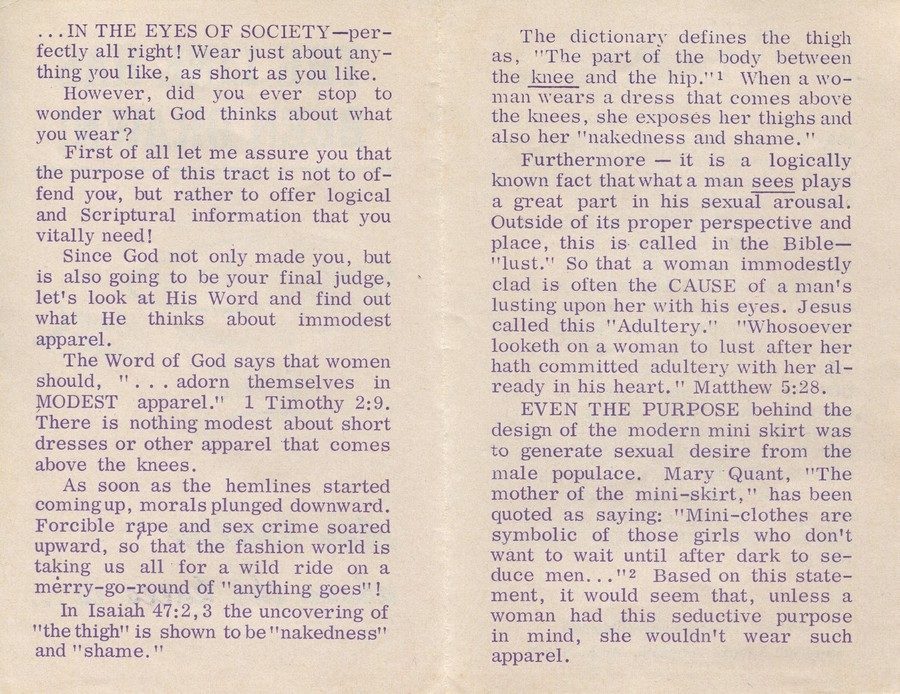

According to the following tract from Tract Evangelistic Crusade (no longer in business) in Apache Junction, Arizona, it is a sin for women to wear miniskirts, short shorts, or bikinis. Be prepared to read lots of slut-shaming.




There is an infatuation with the body, and, of course, the sexual aspects of the body as well. Some sports encourage immodesty, revealing large portions of the body and this happens in some sports. These are the risky sports. Here they are, what are the risky sports? Gymnastics. Gymnastics and swimming. These are the sports in which there is an added risk.
Why are all of the gymnasts [at] more of a risk than other sports? Do you really want your daughters involved in a sport that involves a fair amount of immodesty in which red-blooded American male coaches are interacting with these girls? Or, worse yet, where the infatuation of the body eventually effects the lesbian coaches?
— Kevin Swanson, Gymnastics and the Sexual Abuse of Kids, February 9, 2018
Bruce Gerencser, 66, lives in rural Northwest Ohio with his wife of 45 years. He and his wife have six grown children and thirteen grandchildren. Bruce pastored Evangelical churches for twenty-five years in Ohio, Texas, and Michigan. Bruce left the ministry in 2005, and in 2008 he left Christianity. Bruce is now a humanist and an atheist.
Connect with me on social media:
Your comments are welcome and appreciated. All first-time comments are moderated. Please read the commenting rules before commenting.
You can email Bruce via the Contact Form.
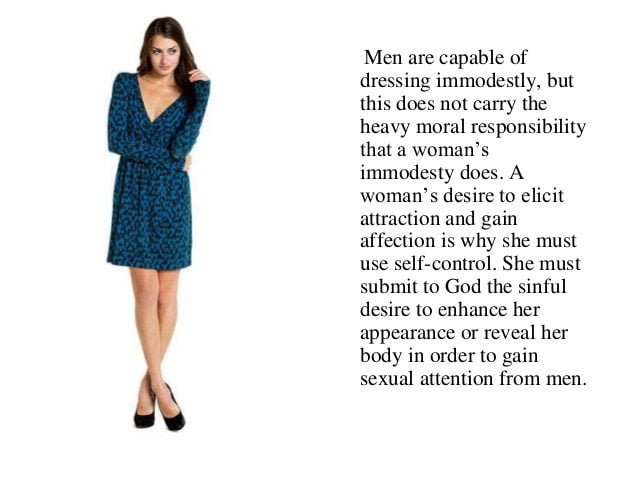
Let’s take the words of Jesus and apply it to women. I don’t know how many women do this, but everyone should look at these words. Men don’t have to take and convert the passage to appropriate language for men because it’s addressed to men directly. It’s our issue.
Women, though, should do this — take the words of Jesus that are addressed to men in Matthew 5:27–29 and convert them into appropriate language for women. Believe me — Tony would vouch for this, I think — based on the questions we’re getting at APJ, there are major sexual-temptation issues going on for women as well as men.
Here’s what Jesus would say if he had said those words today: “You have heard that it was said, ‘You shall not commit adultery.’ You women, you should not commit adultery. But I say to you that every woman who looks at a man, or a woman with a sexy outfit, or a kissing scene on television, or who reads about sexual intercourse in a novel, or listens to one on Audible, or does anything else that feeds the desire to lure their eyes with sexiness has already committed adultery in her heart.” He’s going to be just as blunt with women as he is with us guys, surely. “If your right eye causes you to sin, women, tear it out and throw it away. For it is better that you lose one of your members than that your whole body would be thrown into hell.” Jesus says that to men and women.
Now when Jesus says, “Tear out your eye,” surely he at least means stop using the eye to feed the desire. It may not be possible to avoid every sin-awakening sight in our culture, but it is possible to keep dozens of them out of your eye. It is possible to set before you worthy things, holy things, beautiful things. “Whatever is true, whatever is honorable, whatever is just, whatever is pure, whatever is lovely, whatever is commendable, if there is any excellence, if there is anything worthy of praise, think about these things” (Philippians 4:8). Surely, Paul said that because of the principle “garbage in, garbage out,” or “sexy in, sexy out.”
The principle here is this: find the streams that are feeding the river of sensual desire, and cut them off.
— John Piper, Desiring God, What Wrong with Dressing Immodestly for Attention? January 10, 2018
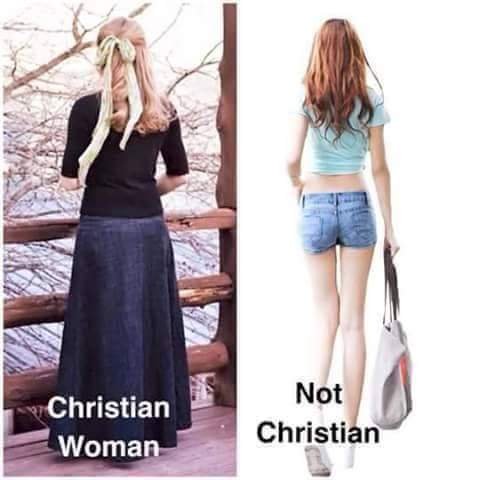
Tim Bunting is a Fundamentalist Bible teacher at the West Harlem Church of Christ in New York. Earlier this year, Bunting wrote a post for the Downtown Demure website titled, An Open Letter About Modesty From a Brother in Christ. Here’s an excerpt from Bunting’s letter:
Okay, before I begin, I get it. You’re tired of talking about modesty. You’ve put forth some effort to conform to all these different standards being thrown at you, but no one ever seems to be satisfied. I know what you must be thinking. “Don’t they know modesty is a hassle? I’m just trying to look fashionable and attractive. People at church continue to stress the importance of modesty while the boys give more attention to the girls in more revealing clothing. Not to mention the fact that no one seems to have any standards of modesty for them anyways.” All this confusion, legalism, hypocrisy, and double standards is just about enough to make you stop caring about modesty all together. What’s the point anymore?
Well let me tell you, I’m tired of talking about modesty as well. I understand. However, we have to keep talking about it as long as it continues to be a challenge in this sexually saturated society.
Keep in mind that immodesty gets so much attention because it’s a visible sin. As saints trying to please God, we can’t ignore sin (I Corinthians 5:2, 12). As long as immodesty is around us, we will continue to have to deal with it. “But aren’t there much deeper problems to worry about? Isn’t immodesty just a physical external thing?”, you might ask. Yes! I concur completely. However, even though immodesty is external, the way we choose to present ourselves is directly connected to our hearts and has great significance on our souls. My hope in this letter is to get to the heart of the matter. I want to thank you for all efforts you’ve already made to be modest. I want to clarify some misconceptions about modesty, and I want to remind you of the real reason you should be concerned about modesty.
…
But why does God care about modesty? God cares about modesty because He is a holy God who calls us to be holy as well (I Peter 1:16). Sexual perversion is unholy, and it’s [sic] participants are unholy (I Cor 6:15-20). Sexual perversion includes any sexual activity outside of a marriage relationship (Hebrews 13:4). That includes lust (looking, thinking, desiring sexual things outside of a marriage) (Matthew 5:27-28). We are also told that anyone who is a stumbling block to others is also held accountable (Matthew 18:6-7). This principle is used to condemn the man for divorcing his wife and tempting her to commit adultery (Mathew 5:31-32). So if there is someone lusting after a person who has presented herself in a sexually appealing way, both parties are guilty of sin, whatever side of the equation they may be. Proverbs also illustrates that one who draws others into sexual sin is condemned along with the one drawn into sexual sin (Proverbs 2:16-19, 5:3-6, 6:24-29, 7:6-23). God wants you to be modest, because God wants you to be holy, pure, and free from sin. God wants you to be these things because this is how He can have a relationship with you, and if you want to have a relationship with Him, then you should care about modesty as well (Psalm 15:1-2).
….
Still, I know what you might be thinking: “If a guy wants to lust, I can’t control that! No matter what I wear, some creep can think sinful thoughts about me. So why am I held responsible for that?” Those are fair questions. Allow me to clarify something. Lust is a choice. Lusting is the choice to indulge yourself with sexual thoughts. God can demand a man to abstain from lust because, regardless of what any person might be wearing, we can choose to not indulge in sexual thoughts. Sexual attraction, however, is not a choice. A man will be attracted to sexual things because God made him that way (He made women that way too). However, a man needs to be led by the Spirit, and not by his fleshly desires (Romans 8:13). A man will be attracted to the many sexual images that surround him on a daily basis, but he must choose to not indulge in lusting over them.
Let me provide an analogy. Imagine you see something cute. A puppy or kitten. A newborn baby. Or perhaps newborn baby taking a nap with a puppy and a kitten.
What happens? You swell up with warmth, and an involuntary “awwwwww” escapes your mouth. Why? Because that’s what happens when you see something cute. You didn’t decide for that puppy or kitten or baby to be cute. They inherently are. You couldn’t stop thinking it’s cute even if you wanted to. Imagine if that warm fuzzy feeling of cuteness is sin. Imagine you are sinning every time you squeal in adoration over something adorable. What could you do about that? How could you stop? You can’t help but think it’s cute. That’s not even a conscious decision. You’d have to look away. You’d have to stop going to pet stores. You’d have to avoid new couples at church with their newborn babies. Cuteness is all around, but you have to make sure you don’t lust after it.
This is kind of what it’s like to be a guy. We didn’t decide for you to be so appealing. God did. God made both sexes to be that way. And it’s a blessing that he did! However, it’s a blessing that can only be enjoyed in marriage. So, a man’s responsibility is to not lust over the things he is sexually attracted to by keeping them from his eye sight. Your concern is to make sure you aren’t one of those sexually appealing things his eyes have to avoid. Here’s the conclusion: you aren’t in sin because someone is lusting over you. You can’t control that. You are in sin if you are presenting yourself in a sexually appealing way. You can control that.
….
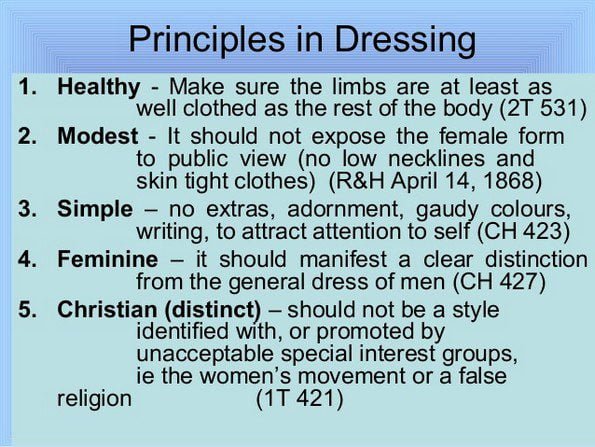
Let me summarize Bunting’s “loving” letter to Christian women:
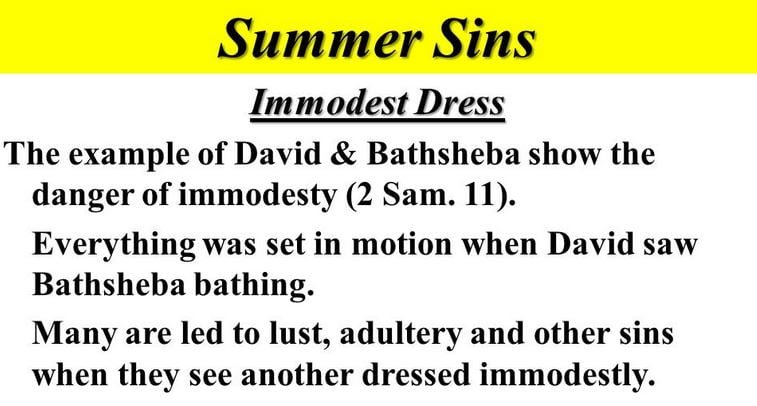
I know, nothing new here. Bunting is just one of a countless horde of Christian preachers who think God has given them the duty and responsibility to police how women dress. Bunting tries his best to not blame women for what he calls male lust, but he ends up talking out of both sides of his mouth. If how a woman dresses can cause a man to lust, then she is responsible for the man’s lust. This is a classic case of laying blame on someone else for one’s own actions.
Bunting says that he plans to keep preaching the gospel of modesty until women heed his words and put their breasts and legs under the cover of oversized feed sacks. And I plan to continue to preaching the gospel of freedom and personal responsibility. Both men and women are responsible for their sexual behavior. Men, in particular, need to learn how to responsibly handle sexual desire. It is normal and healthy to see an attractive woman and sexually desire her. In my gospel, such thoughts are normal. Not in Bunting’s. Desiring any woman sexually besides your wife is a big sin against God, the very God who supposedly wired men to sexually desire women (and for gays, men). Makes perfect sense, right? For weak, pathetic Christian men who are driven to Pornhub by seeing too much cleavage on Sister Sue, the answer is for women to dress modestly. However, wouldn’t it be better if men grew up and owned their sexuality? Wouldn’t it be better if Christian men learned that it is never right to leer at or sexually harass women, and it is most certainly not permissible to touch women without being invited to do so.
According to my gospel, personal responsibility and accountability are paramount. Both men and women are responsible for their own sexual behavior. Christian morality cripples people, making others or outside forces responsible for bad sexual behavior. If church women would just dress modestly, men would be able to sit through the sermon without engaging in lustful thinking. And if women outside of the church would dress as Muslim women do, why Christian men would be able to go through the day with their only stirring being the Holy Spirit. What a wonderful world, one without sexual want, need, and desire; a world where sexual intercourse only takes place within the bonds of marriage and only in the missionary position. Of course, such a world, thanks be to Eros, does not exist. Sexual attraction is here to stay, regardless of how women dress. Clothing, as past human history shows, is not a barrier that protects people from wanting or desiring others sexually. All any of us can do is act decently and respectfully towards others.
About Bruce Gerencser
Bruce Gerencser, 60, lives in rural Northwest Ohio with his wife of 39 years. He and his wife have six grown children and eleven grandchildren. Bruce pastored Evangelical churches for twenty-five years in Ohio, Texas, and Michigan. Bruce left the ministry in 2005, and in 2008 he left Christianity. Bruce is now a humanist and an atheist. For more information about Bruce, please read the About page.
Bruce is a local photography business owner, operating Defiance County Photo out of his home. If you live in Northwest Ohio and would like to hire Bruce, please email him.
Thank you for reading this post. Please share your thoughts in the comment section. If you are a first-time commenter, please read the commenting policy before wowing readers with your words. All first-time comments are moderated. If you would like to contact Bruce directly, please use the contact form to do so.
Donations are always appreciated. Donations on a monthly basis can be made through Patreon. One-time donations can be made through PayPal.

Another day, and yet another blog post written by an Evangelical blaming sexily dressed women for Christian men being unable to keep their lustful thoughts, desires, and actions under control. Geri Ungurean, a Christian Fundamentalist and conspiracy theorist, runs the Absolute Truth From the Word of God website. Today, Ungurean wrote a post titled, Sisters in Christ: Are You Causing Brothers in Christ to Sin in Their Hearts?
As you can tell from the title, Ungurean believes that inappropriately dressed Christian women are causing the male horn dogs in their churches to sin. Ungurean writes:
I remember a time when my husband and I were visiting a new church. The music was way too “Rockin’” for us. But the sermon was good and sound. After service, the wife of the pastor offered to walk us around to meet people.
She took us into a 4th grade Sunday School class. As we walked into the room, the teacher was obviously caught off guard. You see, she was wearing an extremely revealing low cut sweater, and when she saw us she immediately attempted to pull up her sweater.
To say that was an akward [sic] moment would be a gross understatement. As we talked with her, she held onto her sweater to keep it from slipping down where it was before we came in.
Okay. I know that there are going to be women who will be angry with me because I am writing about a “touchy” subject. Well SOMEONE has to talk about this! And please don’t say to me “I think I look nice when I go to church” because I’ve heard it so many times before. Looking “nice” would reflect the motives of your heart. Of course, we women want to look nice when we go to church – or anywhere for that matter. But there is a vast difference between looking nice and looking sexy.
Here’s the deal – If you look in the mirror and you think “I look sexy” then you do not look nice. You are calling attention to yourself, and you are hoping that men will be enticed by you. YES – YOU.
Men are visually oriented
If you are lost and do not care about Jesus or Christian men, then you have an excuse. But if you are born again and have repented and trusted the Lord Jesus for the forgiveness of your sins, then I have some news for you. You are taking the eyes of these Christian men off of the Holy Spirit, and onto your body.
This is sin, and God will hold you accountable for it.
….
Let me summarize Ungurean’s post:
I continue to be hysterically amused by weak, pathetic Christians who can’t bear to see women wearing clothing that accentuates their God-given bodies. I wonder if such people can even go outside, watch TV, or read magazines. Why, there are Jezebels everywhere you look! Perhaps it would be better if Christian men followed Jesus’ advice in Matthew 18:9:
And if thine eye offend thee, pluck it out, and cast it from thee: it is better for thee to enter into life with one eye, rather than having two eyes to be cast into hell fire.
Wouldn’t it be far better to be blind than to face, day after day, sexily dressed women who want nothing more than for men to ravage them?
Ungurean believes that women who violate her dress code are causing Jesus-loving men to take their eyes off the Holy Spirit. Has Ungurean ever “seen” the Holy Spirit? Of course not. According to the Bible, the Holy Spirit is an incorporeal being. He can’t be seen, but women can, and therein lies the problem for Fundamentalists such as Ungurean. Christian women wearing clothes that calls attention to their comeliness are causing men to have lustful thoughts, and, in some instances, inappropriate boners. Now, there can only be one rising from the dead, so church women must go out of their way to make sure they don’t do anything that might cause male stirrings. Again, women are viewed as gatekeepers. Men are too pathetic and weak to be responsible for their sexual behavior. Evidently, once these servants of the Most High God gaze at a woman they find attractive, morality and religious belief are cast to the wind, turning otherwise normal men into dogs looking for a bitch to hump. Poor Christian men!
About Bruce Gerencser
Bruce Gerencser, 60, lives in rural Northwest Ohio with his wife of 39 years. He and his wife have six grown children and eleven grandchildren. Bruce pastored Evangelical churches for twenty-five years in Ohio, Texas, and Michigan. Bruce left the ministry in 2005, and in 2008 he left Christianity. Bruce is now a humanist and an atheist. For more information about Bruce, please read the About page.
Bruce is a local photography business owner, operating Defiance County Photo out of his home. If you live in Northwest Ohio and would like to hire Bruce, please email him.
Thank you for reading this post. Please share your thoughts in the comment section. If you are a first-time commenter, please read the commenting policy before wowing readers with your words. All first-time comments are moderated. If you would like to contact Bruce directly, please use the contact form to do so.
Donations are always appreciated. Donations on a monthly basis can be made through Patreon. One-time donations can be made through PayPal.
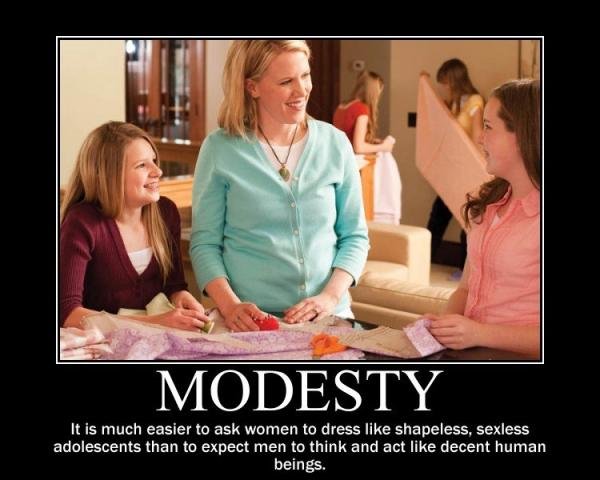
Jeff Harris, pastor of Grace Point Church in San Antonio, Texas and founder of Missional Association, says that a man’s sin is never the fault of a woman, yet he turns right around and says scantily, “sinfully” clad women are indeed culpable when horn dog males act inappropriately towards females. Here’s what Harris had to say on the subject:
Sexual harassment fills the headlines of our culture and the discussion is long overdue. It is good that those who’ve been harassed now feel empowered to name those who have perpetrated unwanted advances, groping, and even rape.
Let me be clear—a man’s sin is never the fault of a woman. A provocatively-dressed woman doesn’t make a man sin. A sensuously-acting woman doesn’t cause a man to sin. The issue is that, in our culture, we don’t look at provocative dress or sensual acting as sin. This is not blame-shifting, because an individual’s sin is their own. But, it does take place in an environment we are all responsible for. I believe there is a facet of this complex, multi-faceted issue that needs to be part of the larger conversation.
We live in a culture where the Supreme Court deems porn as “the right to freedom of the press” Ha! We live in a culture where women wear yoga pants and bra tops as everyday fashion, seemingly unaware of the tenuous balance between dressing for style or comfort and dressing attractively (as in, “to attract”). Think about the word for a moment: “attractively.” Attracting what?
In 1 Timothy 2:9 in the Bible, we read this instruction: “Likewise I want women to adorn themselves with proper clothing, modestly and discreetly, not with braided hair and gold or pearls or costly garments but rather by means of good works, as befits women making a claim to godliness.”
Modesty is lost in our culture. The intersection of sexual objectification and sexual allure results in all kinds of distorted behavior. We have legalized the objectification of women and socialized provocation of men.
Sin is sin! Men who objectify women have distorted and diminished women as conquests for their own gratification. Women who dress immodestly turn themselves into an idol to be sought after and adored. When the two are left unabated in a culture, you get a combustion of sin.
I’m glad we are talking about harassment and the vile practice of using fame, power, or position as a platform to foist oneself upon a colleague. I also think if we called immodesty sin the discussion would be far more common and the culprits would be far more numerous.
Most women I know would be shocked by the way their dress is seen as sexual by the men around them. They are unaware because they have been desensitized by an immodest culture. Modesty is not old-fashioned; it is common sense. Men who sexually harass are called “Predators” but you don’t often hear of the sexually-provocative referred to as “Prey.” At some point, the sexual revolution gave women a free pass. They want the same rights as men but not all the responsibility.
A man should be responsible not to harass a woman just because he has power, position, or fame. A woman should be responsible to present herself in a way that doesn’t scream “want me,” “watch me,” “be attracted to me.” Saying it’s a man’s problem if he glances at the yoga pant-wearing soccer mom at the dentist office is simply naïve as well as disproportionate responsibility shift. The man has the responsibility to guard his heart and eyes. The woman has the responsibility for modesty (to not draw idolatry-like attention to herself).
….
Now, as the accusation of harassment is enough to ruin one’s career, don’t be surprised if some guard rails are put into place. This is not to say harassment is caused by provocative dress; it’s not. A man has to own his own sin. They do coexist within the same environment and a woman must own hers. But first, our culture must acknowledge it.
Harris wants it both ways. He rightly wants to hold men accountable for their behavior, but he also wants to hold women accountable for men’s behavior too, while, somehow, someway, ignoring how men (and women) view and process women dressed in attractive ways. Harris chooses to parrot the Puritanical, anti-human Bible as justification for his pronouncements on the matter instead of demonstrating a basic understanding of human biology and nature.
Women wear what they do for many reasons, as do men. One reason even the good pastor should understand is that humans dress in manners that make them attractive to the opposite sex (or the same sex). When women dress in ways that call attention to their beauty and physicality, they are playing their part in a dance that has been going on for thousands of years. I don’t know of a man who married his wife for her ugliness. Why, out of the all the young women at Midwestern Baptist College, did I set my affection and desire on a dark-haired, shy pastor’s daughter? Her sewing skills? Her typing skills? Her cooking skills? No, I knew nothing of those things when I first met Polly Anne Shope some forty years ago. What I “saw” was a beautiful, attractive woman, a lady who quickly became the love of my life, and remains so to this day.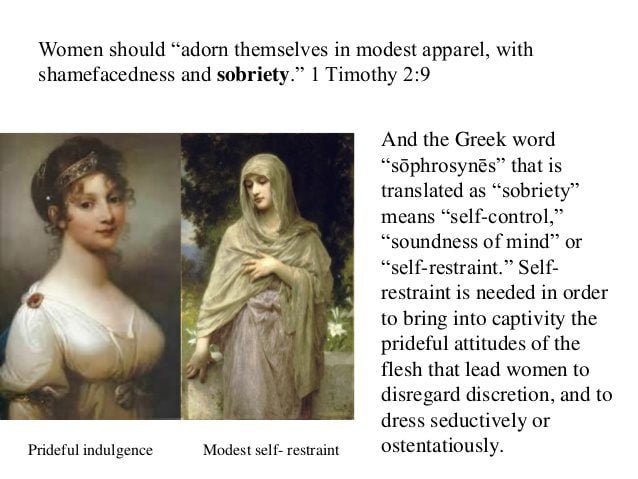
I am not a woman so I can’t speak to the motivations of women when it comes to their wardrobes. Women are free to dress as they please, and men such as Harris have no business shaming them into dressing in ways that make men feel “comfortable.” If a man finds himself sexually attracted to a woman, it is one hundred percent his responsibility to act appropriately. Honest men will admit that they find other women besides their wives, partners, or girlfriends sexually attractive. Duh, right? Looking (not leering) is a healthy, normal male response to women whom men find attractive. What is not appropriate is sexually harassing women, physically assaulting them, or taking advantage of them. Sexual harassment, sexual assault, rape, and all-around creepy behavior is never appropriate even if a woman is standing stark naked in front of a man.
Men are expected to own their sexuality and behave appropriately. There’s nothing wrong with a man expressing interest to a woman, but when she says, no thanks, that’s the end of the discussion. Continuing to pursue a woman who has said “no” is harassment. And it goes without saying that using one’s position of authority and power to take advantage of a woman is morally reprehensible and culturally frowned upon.
Evangelical pastors have been blaming women for male ill-behavior for as long as I can remember. Using the Bible as justification for their pronouncements, pastors teach women that they are gatekeepers given the responsibility to ensure that men don’t “sin” with their eyes (ignoring the fact that women can be and often are just as visually driven as men). How about we go all Biblical on weak, helpless, lustful Christian men and pluck their eyes out. Jesus said in Matthew 18:9:
And if thine eye offend thee, pluck it out, and cast it from thee: it is better for thee to enter into life with one eye, rather than having two eyes to be cast into hell fire.
It’s time for men, Christian or not, to own their sexuality. Men are totally responsible for how they act and respond to women, regardless of how they may be dressing or behaving. No man is so helpless that he cannot control his behavior. Offenders choose to blame women because doing so allows them to continue treating women as objects, and not fellow human beings worthy of respect.
About Bruce Gerencser
Bruce Gerencser, 60, lives in rural Northwest Ohio with his wife of 39 years. He and his wife have six grown children and eleven grandchildren. Bruce pastored Evangelical churches for twenty-five years in Ohio, Texas, and Michigan. Bruce left the ministry in 2005, and in 2008 he left Christianity. Bruce is now a humanist and an atheist. For more information about Bruce, please read the About page.
Bruce is a local photography business owner, operating Defiance County Photo out of his home. If you live in Northwest Ohio and would like to hire Bruce, please email him.
Thank you for reading this post. Please share your thoughts in the comment section. If you are a first-time commenter, please read the commenting policy before wowing readers with your words. All first-time comments are moderated. If you would like to contact Bruce directly, please use the contact form to do so.
Donations are always appreciated. Donations on a monthly basis can be made through Patreon. One-time donations can be made through PayPal.
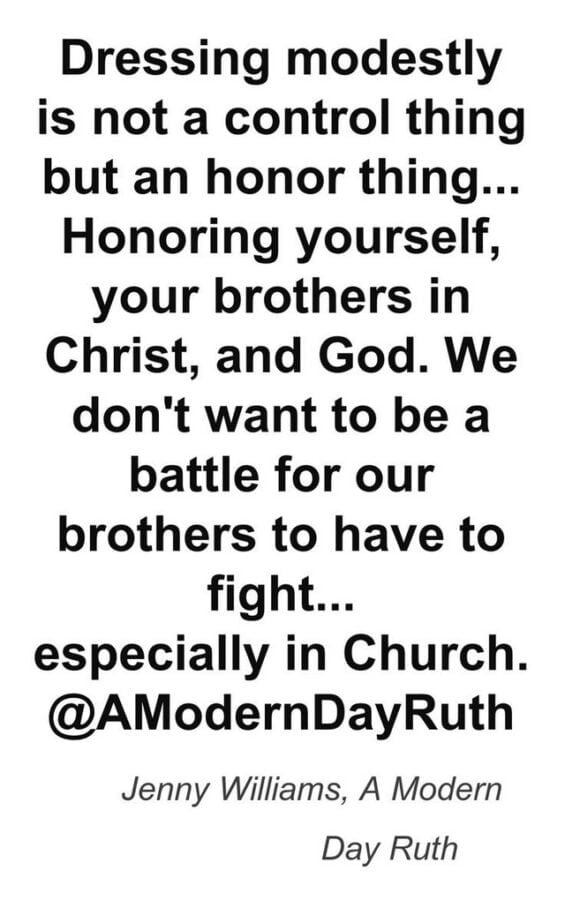
Ladies, your clothes are talking. I hope I can help you know what they are saying. Proverbs 7:10 says, “And, behold, there met him a woman with the attire of an harlot and subtil of heart.” Quite simply, a harlot wears clothing that purposely draws attention to her body, especially certain areas of her body -bust, legs and backside.
….
Before I comment on the immodest clothing some women wear, I would like to point out one example that is too familiar to all of us. That example is the Christian woman who appears this way far too often: t-shirt not tucked in, jean skirt or old, casual, yet comfortable skirt, socks and tennis shoes. There may even be a run in her hose. Most likely her hair is pulled back in a ponytail, if given any attention at all. You ask, “If she is modest, what is wrong with that?” My answer is, “Nothing, if she is planning to clean out the closet or go hiking with her kids.”
1. Too many Christian women bring criticism to Christianity because they look sloppy in their appearance.
When they dress this way frequently, they are giving off the message-“I don’t care how I look.” Of course, as daughters of the King, we want to look our best.
2. The tight-fitting garment.
The following is a way to know if a garment fits too tight on top. If your garment cups under the bustline or around the bustline, it is too tight. You can test this in any full-length mirror. You will be surprised at what you see. If your garment cups your bustline as described, you are giving off this message-“Look at my bust.”
3. The too-sheer garment.
The way to know if your garment is too sheer is to see if your undergarment straps (bra and slip straps) can be seen through your outer garments. If they are visible, this could cause thoughts in the mind of a man that you really do not intend. The message your clothes are giving if too sheer is-“Look at my undergarments.”
….
4. The skirt or dress with a slit.
We all know there is rarely a time when we can purchase a garment with a slit and find that it is already sewn for us to meet our Christian standards. Perhaps you are thinking, “What’s the harm of a few slits? I wear skirts and dresses. That in itself is a big change for me!”
May I give you a good rule of thumb which will answer the above question. A good rule is that your slit should be no higher than two inches from the floor when in an upright kneeling position. Anything higher than that reveals your thigh. Remember, the harlot reveals her merchandise to drum up business. If your slit is higher than the standard given above, you are giving off this message-“Look at my legs.”
5. The too-low neckline.
It is quite frustrating sometimes to shop for a garment which has a high enough neckline to meet our standards. So, many times we settle for what the stores have to offer because we want to stay in style. We can be in style in a modest way without lowering ourselves to the world’s standards.
Find the “U” right below your neck and at the top middle of your collar bone. Now, place your four fingers closed together at the bottom of your “U.” If skin is showing below your four fingers, your garment is too low. Anything worn with a low neckline draws attention to your chest area. Just remember this: “The lower the neckline, the more curious a man gets.” Surely we do not want to put men in that position. I believe many Christian women are ignorantly doing this. When your neckline is too low, you are giving off this message-“Look at my bust.”
6. The tight skirt or tight-fitting part of a dress below the waist.
The following test will determine if your garment fits too tightly below the waist. Stand in front of a full-length mirror. If your skirt cups under your backside or abdomen, it is too tight. One thing I have seen that is a turn-off and quite unbecoming is panty lines showing through a skirt. If the skirt would have been looser, I would not have had to view this, and neither would our Christian men who are trying hard to keep their minds clean. Also, we want to avoid being sensuous. When your skirt is too tight, you are giving off this message-“Look at my backside.”
….
It would seem that there are only two reasons why women dress immodestly:
1. A mind problem.
Women do not think through how they look each day in front of a full-length mirror. They should take a few seconds each morning to quickly check the bustline, backside, slits, etc.
2. A heart problem.
Women are now aware of the messages they give when they wear certain types of garments or wear them are an immodest way. Some women continue to wear immodest apparel or try to hide behind excuses or simply know better but do it anyway. They need to be reminded that the harlot was “subtil of heart.” “Subtil” means “cunning” or “clever.” In other words, she knew exactly what she was doing. Christian women need not be “subtil of heart.”
— Zana Reichen, Instructor at Hyles-Anderson College, Crown Point, Indiana, Quote found in A Christian Lady’s Dress and Appearance by Art Kohl

Some of you are ultra-conservative but I am not. I wear dresses and skirts just above my knees. I even wear shorts once in a while and some of my thigh shows. (One woman told me there is a verse about the thigh not showing so I asked her for it but she never responded.) I watch some TV (Hallmark, Fox News, The Duggars and The Bates Shows, and a few others) and go to the movie theater (but am careful about what I see – no nudity, sex scenes, vulgar language, etc.).
Recently, someone grabbed a picture that my daughter-in-law posted on her Instagram story of me with a skirt on with shorts underneath and some of my thigh showing. It was the Fourth of July and I was with my sons and their families and Ken. My legs were up on a footstool so more of my thigh shows than normal.
….
If I knew my daughter-in-law was filming me and even if another man besides my sons or husband were around, I would have put my feet down on the ground but I didn’t know and had no clue that some woman would use it against me but this is what they do. They search and scour everything I write and every picture they can find about me (even from my children and their spouses) to try to destroy my ministry and make me into a hypocrite.
My family knows about it and they think it’s silly because they all know that I dress modestly. I never wear leggings unless I have a dress over it. I never wear low-cut tops, bikinis, short shorts, or a short skirt or dress. My modesty standards may not be the same as yours (some women were upset with a comment Ken made about some thigh showing) but that doesn’t mean we are wrong. I listen to godly men and what they consider immodest and dress accordingly. I don’t believe we need to wear burkas (as some women have told us) and cover our hair, faces, shoulders, and ankles. This isn’t what the typical man lusts after.
I have heard that some men have foot fetishes but this doesn’t mean we can never go barefoot. This is a problem with the men and yes, there are men who are perverts and will lust no matter what women wear but this isn’t our problem. It’s theirs. As godly women, we need to know how the typical man thinks and dress to not be a stumbling block to them.
— Lori Alexander, The Transformed Wife, No I Am Not Ultra-Conservative, June 12, 2017
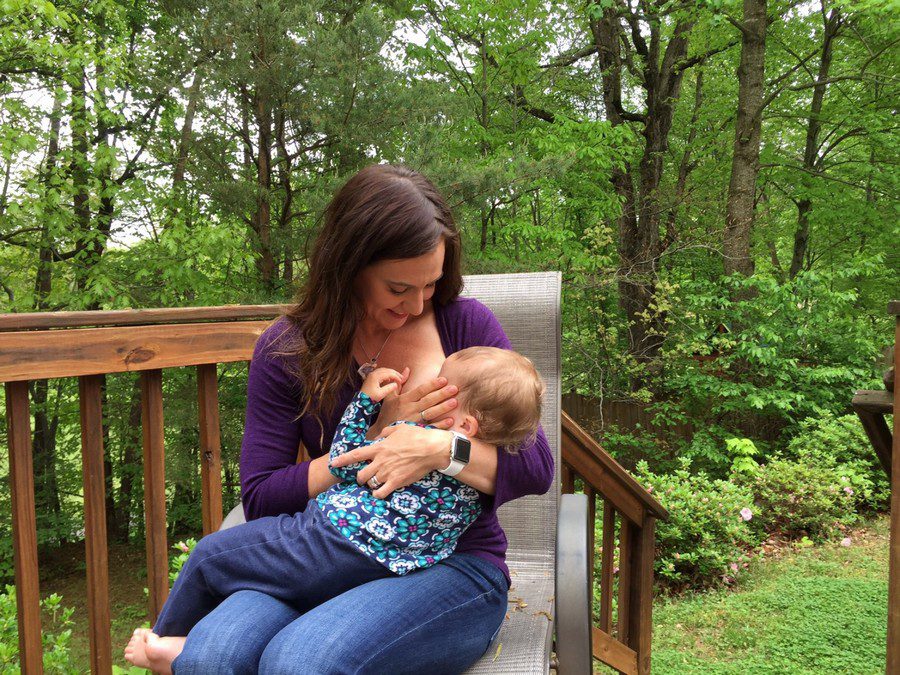 Annie Peguero and her nineteen-month-old daughter attended church last Sunday at Summit Church in Springfield, Virginia. During the service, Peguero’s baby became hungry, so she breast-fed her. Little did she know that she was surrounded by horny, weak, pathetic men who can’t control their sexuality when ‘forced” to view a breastfeeding mom’s partially exposed breast.
Annie Peguero and her nineteen-month-old daughter attended church last Sunday at Summit Church in Springfield, Virginia. During the service, Peguero’s baby became hungry, so she breast-fed her. Little did she know that she was surrounded by horny, weak, pathetic men who can’t control their sexuality when ‘forced” to view a breastfeeding mom’s partially exposed breast.
Annie Peguero was trying to soothe her agitated 19-month-old baby in church on Sunday when she did what she often does — she nursed her. But her efforts to calm her daughter caused a stir in the sanctuary of Summit Church in Springfield.
A woman promptly asked the Dumfries mother to decamp to a private room, she said. Peguero declined and was later told that the church does not allow breast-feeding without a cover because it could make men, teenagers or new churchgoers “uncomfortable,” she said. One woman told her the sermon was being live-streamed and that she would not want Peguero to be seen breast-feeding.
The mother of two left her seat in the back of the church and fled, embarrassed and in shock. The next day, she posted her own livestream video on Facebook — with her baby, Autumn, at her breast — telling viewers what happened and urging women to stand up for breast-feeding.
“I want you to know that breast-feeding is normal,” she said.
It is also a legally protected right in Virginia, where the legislature passed a 2015 law that says women have a right to breast-feed anywhere they have a legal right to be.
….
Peguero, a 42-year-old personal trainer and fitness and nutrition specialist, often posts live videos online with tips and advice about managing life with two young children. She talks about getting through the day when a spouse is deployed, drawing on her own experience as the wife of a Marine serving overseas.
The self-described “hippie mama” said she looked forward to breast-feeding long before she had children.
“I knew it was the very best thing for my baby,” she said. “I wanted to give them that gift for as long as I could, and that’s what I did.”
She nursed her older daughter — now 4 years old — until she was 8½ months pregnant with Autumn. In all that time, she never had a problem nursing in public, she said.
“I have breast-fed in a few different countries. I have breast-fed all over the place,” she said. “No one has ever said anything to me.”
Virginia was one of the last states to pass a law protecting a woman’s right to breast-feed in public.
Before passage, women in Virginia had the right to nurse their babies on state-owned property, but restaurants and other privately owned businesses that were open to the public could prohibit it.
Under identical bills brought by Del. David B. Albo (R-Fairfax) and Sen. Jennifer T. Wexton (D-Loudoun), mothers are permitted to breast-feed anywhere they are “lawfully present.” The measures cleared the Republican-controlled House and Senate without opposition and were signed into law by Gov. Terry McAuliffe (D).
Albo and Wexton were not familiar with the details of Peguero’s case but said the law clearly gives women the right to breast-feed anywhere they are otherwise allowed to be.
“Women don’t really have a choice,” Albo said. “If you have a kid, and the kid’s hungry, you have to feed ’em.”
Wexton said she brought her bill after hearing from a woman who had been told she could not nurse her baby in a hallway outside the children’s room at her gym. Employees said she could only breast-feed in the bathroom, Wexton said.
“The fact is, women just want to feed their babies. Women are very discreet about their breast-feeding. . . . It’s not in any way an indecent exposure situation,” she said.
Leave it to Evangelicals to have a big problem with a human natural process — breastfeeding. What’s more natural than a mother feeding her child using the mammary glands the good Lord gave her? The problem is that Evangelical men are deeply immersed in a culture where women’s breasts have been sexualized. And as with anything having to do with sex while the lights are on, Evangelical churches and pastors — at least as far as the keepers of male mental virginity at Summit Church are concerned — overreact and enact stupid policies and rules.
Sadly, a century of Evangelical obsession with sex has resulted in multiple generations of men being taught that they are not in control of their sexuality, and that women are seductresses out to bed them. Women are forced to cover up their bodies and mute their comeliness lest some horn-dog of a man cast a glance their way and feel some sort of sexual stirring. Evidently, the Holy Spirit living inside Evangelical men is not enough to keep them from lusting during their pastors’ sermons.
Non-Evangelicals read posts such as this one and snicker while shaking their heads. There is nothing sexual about women breastfeeding their children. Babies need to eat, end of discussion. As long as women are discreetly feeding their babies, I can’t think of one reason why their doing so should be a problem. My wife breastfed all six of our children. Rarely did she leave a church service to do so, and if she it did it was because the child was being fussy and she didn’t want to disrupt the service.
I pastored scores of breastfeeding women during the twenty-five years I spent in the ministry. I can think of only one time where a woman breastfeeding a child proved to be a distraction. One Sunday, as I was preaching away on the unsearchable riches of Christ, a church member sitting about three rows back unbuttoned her dress, pulled up her bra, and fully exposed her breast. She did this so her four-year old child could have a snack. Most church members had no idea what was going on in the third row, but unfortunately for me, I had a boobs’-eye view.
In many Evangelical churches, men are viewed as metaphorical infants, unable to control their desires. Women are repeatedly told that they must be the adults in the room, and for the sake of infantilized men, cover their bodies. What’s even more astounding, as in the story mentioned above, is that it is left to church women to police their ranks. Taught that they must be gatekeepers, church women make sure that no Jezebel tempts their men. Perhaps the real solution to the breastfeeding problem is for men to own their sexuality. Stop with all the silly rules that only serve to embarrass and demean women. To Evangelical women, I say, it’s time to rebel against thinking that reduces women to sex objects. Of course, such rebellion requires Evangelical women (and men) to stand against the patriarchal, anti-women bullshit that their pastors preach Sunday after Sunday. Sadly, I am not hopeful that church women will do so. The pressure to conform is so great, that only by leaving Fundamentalist churches can women truly be free.

Warning! Slightly risque language ahead. You have been warned.
Another day, any yet another Evangelical explaining the importance of women covering up their bodies lest they cause men to “sin.” Today’s member of the clothing police is Kara Barnette, wife of Tim, pastor of Faith Baptist Church in Faith, North Carolina. In a post titled Modesty Matters, Barnette had this to say about modesty and the dangers of women spreading their “sin” to men:
It’s that beautiful yet dreadful time of year when summer clothes come-out. And it seems that every summer shorts get shorter, necklines plunge lower, styles get tighter, and fabrics are so thin that one could read a newspaper through them. Yet issues over modest clothing aren’t just significant to the Amish and crotchety old people who complain about “those ‘dang teenagers.”
When a glutton eats too much, no one else gets fat. And when a thief steals from a convenience store, only the thief goes to jail. But when a young lady dresses inappropriately, the effects of her sin are expansive.
Her sin spreads.
As she strolls down the beach in her immodest bathing suit or worships on a Sunday wearing a revealing dress, everyone who sees her is handed temptation. The men and boys around her must battle the sin of lust, while the women and girls around her must battle the sins of bitterness and jealousy and the temptation to show-off their bodies, too. Everyone is distracted by the young lady’s clothing and everyone struggles to think pure thoughts.
Sadly, today there is often little difference in the immodest clothing choices between girls who’ve never heard the name of Christ and those who come from Christian homes. Satan is winning the war of indiscrete clothing, and these are the weapons he’s using on parents:
….
My daughter must dress in short/tight athletic-wear to play her sport. Newton’s Lesser-Known Fourth Law of Motion: A volley ball will travel at the same velocity and direction whether it’s served by a player dressed appropriately or by a player dressed inappropriately. (The law likewise holds true for golf, tennis, and soccer balls, as well as for the dynamics of jogging, cheerleading, and dance…) Joking aside, if a team uniform doesn’t meet God’s standards and an alternative is not allowed, then God doesn’t want my daughter playing that sport or participating in that activity. Her personal testimony is worth even more than an athletic scholarship to college.
I can’t find modest clothing for my daughter. Principals often hear this complaint from moms about school dress codes, and youth pastors similarly struggle to enforce clothing standards for youth groups and camps. God has plenty to say about ladies dressing modestly (1 Timothy 2:9, 1 Timothy 2:8-10, 2 Peter 3:1-4), and He doesn’t give commands that our daughters cannot follow. Shop a different store. Order on-line. Buy a sewing machine and make clothes yourself. Or have your daughter wear the same modest clothing over and over if that’s all she has. Parents must go to whatever lengths necessary to help our daughters protect their purity.
My daughter will hate me if I make her dress conservatively. Following the Lord’s commands should not be a chore, but a joy! Teaching a daughter to present her body as… ‘a living and holy sacrifice, acceptable to the God, which is her spiritual service of worship’ (Romans 12:1) ought not be a knock-down fight in the dressing room at the mall; it should be a pleasant experience as she learns to embrace colors, fabrics, and styles that please God and accentuate her beauty. All rules given by the Lord are for our good and His glory, so helping girls learn to dress modestly can be a fun and creative challenge.
Modesty isn’t an important Scriptural issue. Tell that to the wife humiliated by her husband’s pornography addiction. To the congregation who lost their pastor because he had an affair. To the teenager who has to inform her parents she’s pregnant.
….
My daughter needs to show some skin if she’s going to get a guy. Allow your daughter to dress provocatively so she can catch the attention of boys, and you’ll get your wish. But it won’t end well for her.
While you would never throw chum into the ocean water where your little girl was swimming, you’re doing something far more dangerous when you allow her to capture boys with her body. It’s a deadly proposition.
Just ask Bathsheba.
2 Samuel 11:2 simply states… and from the roof he saw a woman bathing; and the woman was very beautiful in appearance. David’s sinful lust of Bathsheba was provoked because of her revealing appearance. David didn’t fall for Bathsheba because she was a great conversationalist, or because he felt an emotional connection to her, or because she could cook a delicious rack of lamb.
He fell for her skin.
And while we will never fully understand Bathsheba’s culpability in the affair, we know that it sure caused her a lot of grief. Literally. Bathsheba would eventually grieve both the death of her faithful husband Uriah and the baby she conceived with David.
When we allow our daughter to show too much skin, we lead her into temptation. We deliver her into evil. And that evil is contagious: it not only harms her but will infect every person she contacts.
Modesty matters.
Once again, we have an Evangelical blaming “immodestly” dressed women for the inability of men to keep themselves from “lustful” thoughts. Pathetic men, they are, who can’t control their thoughts once their eyes focus on women showing too much of their bodies. In Barnette’s mind, dressing “immodestly” causes women to spread their sin and we all know that women spreading their sin leads to them spreading their legs.
Yes, we live in a culture when women publicly expose more skin than previous generations. My God, my wife wore a dress to a wedding last weekend that showed a bit of cleavage! What’s the world coming to? Doesn’t Polly know that she is spreading her sin by wearing a 38DDD push-up bra? (Her first push-up bra, by the way — a sure sign of her atheistic depravity.
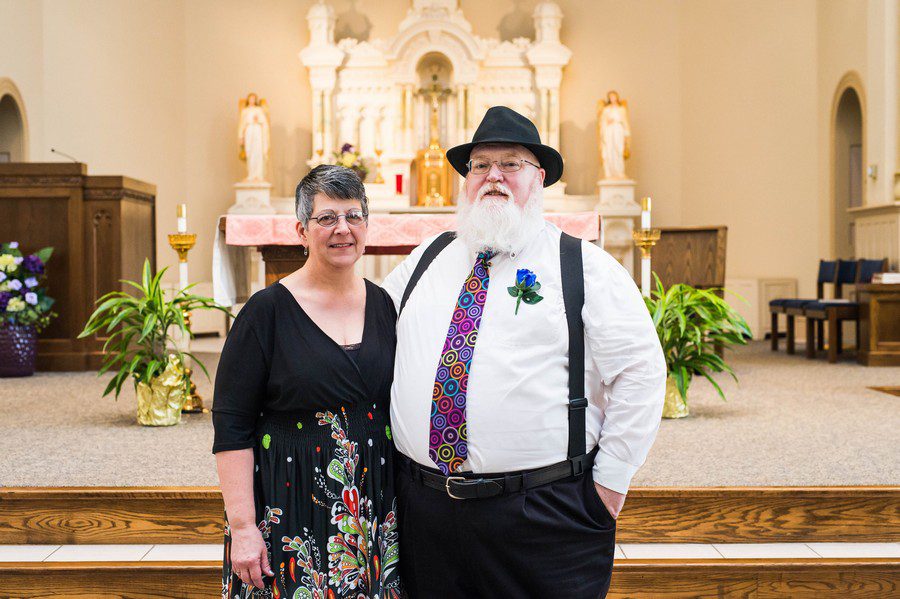
Barnette’s problem is that she is immersed in a Fundamentalist religious culture that treats human sexuality as something that must tamped down and, at times — because the Bible commands it — denied. Women are viewed as Jezebels, temptresses out to bed every man who casts a gaze their way. These weak, pathetic, horn-dog men have little or no power to keep themselves from lusting (evidently God living inside of you is not even enough), so it is up to women to keep men from lusting by covering up their bodies and avoiding behaviors that might lead men to think they are “available” — Greek for “easy.”
Most Evangelicals are Republicans who supposedly believe in personal responsibility. One need only listen to Evangelical congressmen pontificate about welfare and the importance of holding assistance recipients accountable for their behavior to see this thinking at work. Yet, these haters of the poor attend churches that preach, when it comes to sexual matters, that heterosexual men are not totally accountable for what are deemed immoral behaviors; that women who tempt men to lust are also culpable for their “stiff prick having no conscience” (a line told to Midwestern Baptist College ministerial students by crusty IFB preacher Paul Vanaman).
Lust is a religious construct meant to elicit fear and guilt. Two thousand years of preachers lustily preaching about the dangers women present to unsuspecting men have led to the female sex being blamed for the inability of the males of the species to keep from wanting to bed women they find attractive. And therein lies the problem. Evangelicals live in denial of their biology — that men and women being physically attracted to one another is necessary for the propagation of the human race. Some Evangelicals will grudgingly admit the biological aspect of human existence, but will then say that our biology has been corrupted by the fall — Adam’s and Eve’s sin in the Garden of Eden.
Remember the story? God created Adam and Eve naked, put a mystical fruit tree in the middle of their subdivision, and told them he would kill them if they ate fruit from the tree. Adam and Eve ignored God’s threat and once they ate kumquats off the Tree of Knowledge of Good and Evil, they became knowledgeable of good and evil. Since that day, all humans are cursed, born with a “sin” nature. According to Evangelicals, we don’t become sinners, we are by nature sinners — haters of God. This is why we need the salvation that was made possible through the sacrificial death of the God-man Jesus on the cross.
The first thing God did after confronting Adam and Eve over their poor choice of a snack was to kill several animals and make the sinning couple one-of-a-kind fur outfits — covering up their nakedness. Implicit in this story is that nakedness is sinful. Christians, Muslims, and Jews have spent several millennia drilling this idea into the minds of primarily the fairer species. Why? Because it was Eve who first ate of the Tree of Knowledge of Good and Evil. It was Eve who gave a kumquat — I love that word — to Adam. Get the gist of the story? Adam may have been the head of earth’s first family, but Eve is the one that plunged the entire human race into sin. A woman was to blame then, and women are to blame now.
Let me conclude this post with my view of human sexuality and personal accountability. I am an atheist, so Barnette’s Puritanical, anti-human views on sexuality play no part in my sexual ethic. I recognize that I am sexually attracted to some women. How women dress can get my attention sexually. As Polly will attest, my eyes have on more than a few occasions been drawn to the comely shape of women who are not my wife. (And Polly will admit to the same. Last weekend she told me over dinner, why are some gay men so damn attractive? I laughed, thinking of how, not so many years ago, such a discussion would have been impossible.) I subscribe to the look but don’t touch school of thought. Everywhere I look I see attractive women. I saw them as a fifteen-year-old Baptist virgin and I see them forty-five years later as a well-used atheist. What I have learned as a grown-ass man is that I am TOTALLY responsible for my sexual behavior. I am TOTALLY responsible for how I deal with my sexual desires. It is up to me, not women, to control my sexuality. If I behave inappropriately, the only person responsible for my behavior is yours truly. I am mature enough to be around women I might find attractive, and if I feel some sort of sexual stirring — down boy, down boy — it is up to me to control my physical response.
My wife and I are in a committed monogamous relationship forty years in the making. Now that we have been liberated from the sexual bondage of Christianity, we are free to embrace our sexuality, while, at the same time, living according to the commitment we made to each other thirty-nine years ago on a hot July day in Newark, Ohio. Both of us are TOTALLY responsible for how we behave sexually. Knowing that marriage is far more than sex, neither of us worries about the other being tempted to sin by a nice ass or an attention-seeking babe or hunk of a man. (And yes, both of us are comfortable enough in our sexual skins to admit that there are times we have found someone of the same sex attractive, all without flying a rainbow flag on our porch.)
Humanism and Buddhism teach me to treat others with respect, and while I may not be able to control what happens to or around me, I am responsible for how I respond to these outside influences. When a nurse puts an IV in my arm I know it is going to hurt, and that it might take her several attempts to get the job done (thick skin, deep veins, genetic curse). I also know that it is up to me to decide how I respond to the nurse. After making sure the nurse has sufficient experience to do the job (I am considered a difficult stick, so only the experienced need apply), I turn to humor to control the pain that is coming. I tell the nurse about my best and worst phlebotomist list, sharing stories about who is at the top of the list. Once the IV is in, I let the nurse know where she placed on my list. By doing this, I am choosing to be accountable for how I respond. I have heard more than one patient go into a profanity-laced tirade at a nurse who couldn’t magically make an IV insertion pain-free. It is not the nurse’s fault, and blaming her is misplaced. So it is with people who wrongly want to blame women for the moral failures of the human race. Barnette’s blaming of women for unapproved chubbies is misplaced. Men are, from start to finish, responsible for how they respond when sexually attracted to women. Instead of long lists of rules that have proved to not work, why not teach not only men, but women too, how to behave sexually. Surely Evangelical churches can teach men that the Billy Graham rule — never allow yourself to be alone with a woman who is not your wife, a rule even Jesus didn’t practice — is fear-mongering bullshit; that the Vice President of the United States should be able to have a private lunch with a woman without fearing that he will succumb to lust and try to fuck her. Surely the people who gave us purity rings made in China can instead teach men and women that it is not what you wear that matters — no ring has ever successfully kept young adults who want to have sex from doing do; that the choice of how to respond to sexual attraction rests solely with us, not others; that inappropriate sexual behavior by me is not anyone’s fault but mine.
Bruce Gerencser, 66, lives in rural Northwest Ohio with his wife of 45 years. He and his wife have six grown children and thirteen grandchildren. Bruce pastored Evangelical churches for twenty-five years in Ohio, Texas, and Michigan. Bruce left the ministry in 2005, and in 2008 he left Christianity. Bruce is now a humanist and an atheist.
Connect with me on social media:
Your comments are welcome and appreciated. All first-time comments are moderated. Please read the commenting rules before commenting.
You can email Bruce via the Contact Form.